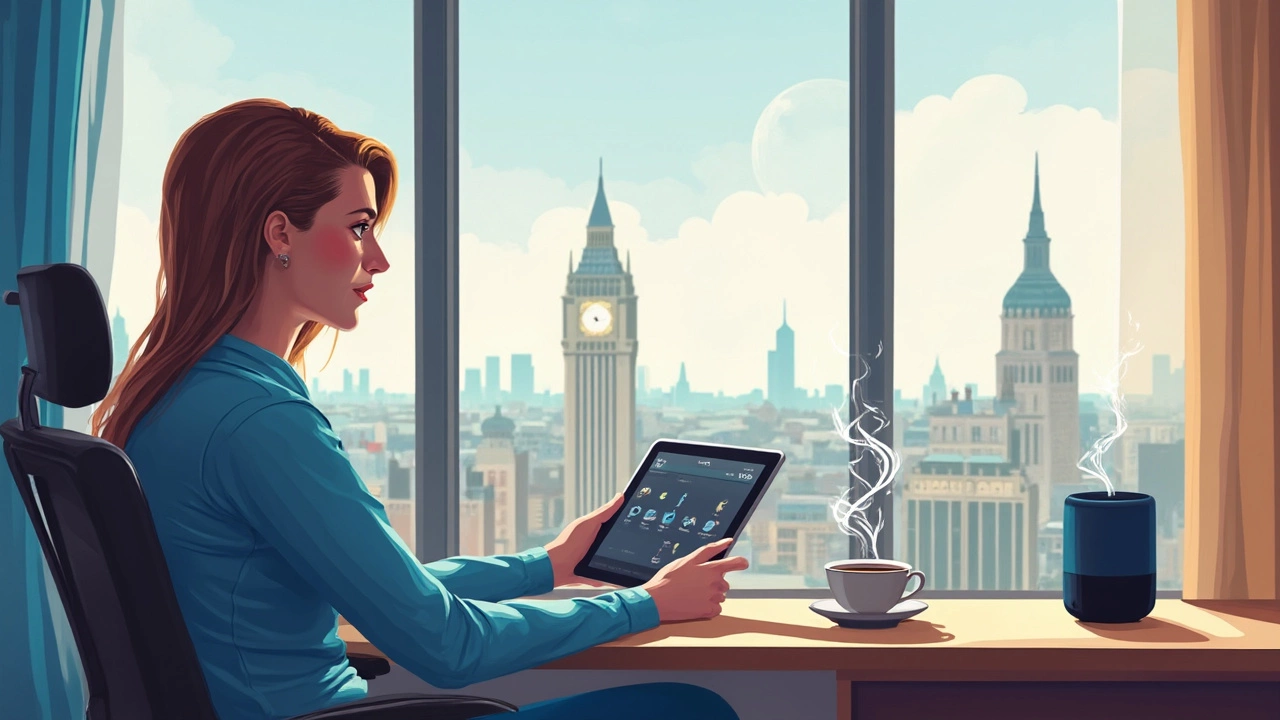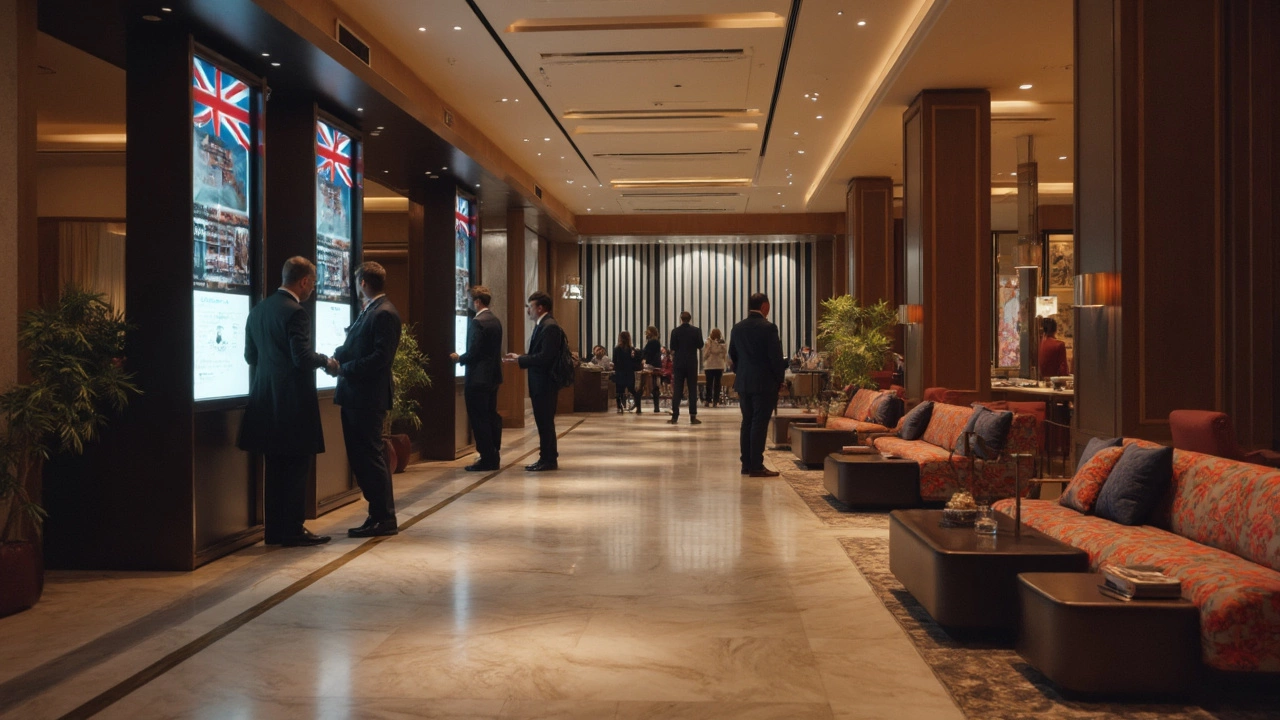What Makes a Hotel Business Unique? Insider Insights for Business Hotels
15 Jun, 2025Ever wonder why some business hotels feel like a second home while others make you count the hours until checkout? It’s not always about price or brand. The secret sits in a pile of little details—stuff most people don’t notice until it’s missing or done wrong.
Take check-in, for example. If you breeze through with a smile and a fresh coffee in hand, chances are you’ll actually remember that place. If you’re stuck behind someone arguing over a booking, you’ll remember that too—but not in a good way.
These touches matter even more for business guests who are always in a rush, juggling meetings and emails. A great business hotel gets this. They focus on what helps you work smoother, relax quicker, and maybe even enjoy the trip a little more. In the next section, I’ll get into what really separates the winners from the rest, no fluff—just the stuff that works.
- The Hidden Details That Make or Break a Business Hotel
- Tech That Wows: Going Beyond Fast Wi-Fi
- Location: More Than Just a Map Pin
- People Power: Service That Sticks with You
- Work, Rest, Repeat: Smart Room and Facility Design
- Standing Out: Tips for Business Hotel Success
The Hidden Details That Make or Break a Business Hotel
The funny thing about the best business hotels is that you hardly notice how much they’re doing right. Great ones don’t just meet the basics—they make tiny adjustments that actually help guests feel human, not just like heads in beds. Let’s break down a few of these under-the-radar details.
First up: power outlets. Isn’t it wild how a single misplaced outlet can mess up your morning? Smart business hotels put charging ports and sockets everywhere you’d actually use them—beside the bed, at the desk, and in the lobby. According to a 2023 corporate travel survey from Skift, over 80% of business guests rate “device charging access” as one of their top frustrations with older hotels.
Next comes check-in and check-out. Forget the old desk queues. Now, top hotels roll out mobile check-in, digital key cards, and even in-app room service requests. Marriott reported a 25% increase in guest satisfaction at their business hotels after going digital with check-in. Less time waiting, more time working or chilling.
It’s also about the little extras. Free water bottles, properly stocked coffee stations, and practical amenities like sewing kits or phone chargers at the front desk—they’re not flashy, but they turn an average stay into a great one. Some chains let you borrow a yoga mat, umbrella, or even a portable monitor, no questions asked. These might seem small, but if you’re traveling for work, they can totally save your day.
Soundproofing isn’t glamorous, but it’s a game changer. If you can fall asleep without hearing the elevator or hallway chatter, you’ll give that hotel serious bonus points. The best places put real money into thick doors, double-paned windows, and clever room layouts to cut out the noise.
Lastly, you’ll notice the difference in how staff handle the little stuff: a speedy fix if your key card glitches, knowing your name if you’re a repeat guest, or solving issues without the whole “let me check with my manager” routine. These details add up. Business hotels that sweat the small stuff score loyal repeat customers, because the guests never have to stress about what’s missing—they can just focus on why they’re there.
Tech That Wows: Going Beyond Fast Wi-Fi
Sure, fast internet is the basic need, but today’s business hotels push way further. Business travelers expect smart tech that skips the hassle and actually saves time. Hotels who get this right aren’t just giving you a router—they’re building an actual experience that just works, every step of the way.
Mobile check-in has become a game changer. Instead of waiting at the desk, you just tap through an app and your phone doubles as your key. As of 2025, about 63% of the top 100 business hotels worldwide now offer digital key technology. Guests get to their rooms faster, and staff spend less time on paperwork.
Then there’s room automation. No more hunting for light switches or fiddling with air conditioning. Many hotels use smart controls to let guests adjust lighting, temperature, and even window shades from a single tablet or from their phones. Marriott’s M Beta hotel in Charlotte set up rooms where you can do everything with a tap—including ordering extra towels, booking meeting space, or sending feedback straight to management.
Meeting spaces have had a serious upgrade, too. Forget old projector screens and tangled cables. Good business hotels offer:
- Wireless presentation systems like Barco ClickShare
- On-demand video conferencing tools in every room
- Plug-and-play adapters for every device under the sun
- Fast wireless printing from your phone
If you like numbers, here’s what’s typical in tech-savvy business hotels as of this year:
| Tech Feature | % of Top Business Hotels Offering It (2025) |
|---|---|
| Mobile Check-In/Key | 63% |
| Automated Room Controls | 49% |
| Wireless, On-Demand Printing | 56% |
| Dedicated High-Speed Wi-Fi in Meeting Rooms | 81% |
| Contactless Payment Everywhere | 88% |
If you’re booking for a big team or running events, check if the hotel’s tech team is actually on call. There’s nothing worse than a dead projector five minutes to a pitch, and the good hotels know this.
Bottom line? The best business hotels use tech to make the annoying stuff invisible. If something lets you focus on your work instead of the hotel’s quirks, you’re in a place that gets it.
Location: More Than Just a Map Pin
Ask any road warrior, and they’ll agree: where a business hotel sits makes or breaks the trip. Forget the old idea that “downtown” is always best. What really matters is smart positioning—close to where guests need to be, not just where the city’s hottest clubs are.
For a business hotels guest, you want easy access to major offices, conference centers, and quick airport rides. That means less time in traffic and more time nailing your agenda. For example, in New York, hotels around Midtown get scooped up fast because they’re near corporate hubs and Penn Station. In Singapore, business hotels along Orchard Road thrive thanks to their combo of malls, embassies, and finance towers.
Here's something you might not know: According to STR data from 2024, business hotels within 2 kilometers of main business districts enjoy 18% higher occupancy rates than those farther out.
But location goes beyond commute times. Hotels that sit near quick eats, easy public transport, and late-night pharmacies win big. When Wi-Fi gives up or you lose your charger at midnight, these small features save your day. Use this quick table to see how it stacks up in three top cities:
| City | Key Location Perks | Average Occupancy (2024) |
|---|---|---|
| London | Walk to Underground, close to The City, 24/7 convenience | 83% |
| Tokyo | Adjacent to rail hubs, quick airport express, near business towers | 87% |
| Dubai | Minutes from DIFC, direct airport highway, food courts nearby | 79% |
If you’re picking or running a business hotel, don’t just look at the map. Ask: can guests actually get around fast? Are there things they’ll need at their fingertips? Today’s travelers don’t have patience for hidden corners and hard-to-find addresses. If you want your place packed year-round, practical location always wins over fancy zip codes.

People Power: Service That Sticks with You
If you ask what really drives loyalty to business hotels, it's solid, reliable service. Guests want to feel like their time matters. A 2023 Cornell Hospitality study showed that business travelers rank "helpful staff" higher than room design or even loyalty perks when deciding where to return. It’s simple: friendly, quick, and effective staff make your trip better.
One real difference? Personal touches. It’s the front desk clerk who remembers your name or the barista who nails your coffee order first try. Here’s how smart business hotels put people first:
- Speed over show: Fast, no-nonsense check-in cuts stress. Some hotels claim you’ll be in your room in under three minutes (and regulars say they deliver).
- Local knowledge: Staff who know the neighborhood give out smart tips. Need a quiet spot for a client call or the best salad bar close by? The best hotels train their people to know answers off the top of their heads.
- Proactive help: Not just solving problems, but spotting them. For example, at some Marriott and Hilton properties, staff flag regulars’ preferences—like extra pillows or a late checkout—before the guest even asks.
Let’s be real—mistakes happen. What matters is the fix. Guests who get a fast, sincere solution are 60% more likely to book again, according to Hotel News Now.
"Exceptional guest service isn’t about being perfect. It’s about showing the guest you care and having their back when things go sideways." — Alice Davis, VP of Guest Experience at Hyatt
Want some numbers? Here’s what recent traveler surveys show about staff impact:
| Factor | Percent Citing as Most Memorable |
|---|---|
| Helpful staff interaction | 42% |
| Room comfort | 21% |
| Location | 19% |
| Tech amenities | 12% |
| Other | 6% |
Bottom line: People make the place. When staff focus on saving you time and actually care, you notice—sometimes more than any fancy feature or swanky lobby.
Work, Rest, Repeat: Smart Room and Facility Design
For business hotels, room and facility design isn’t just about looking good—it’s about actually making life easier for guests who might spend more time on a laptop than at the spa. The best hotels nail this balance with practical setups, thoughtful touches, and flexibility in every corner.
One thing that stands out: easy-to-reach power outlets. Older hotels usually tuck sockets behind furniture, forcing you to do gymnastics every time your phone needs juice. Leading business hotels put USB and international outlets right where you need them: above the desk, next to the bed, sometimes even in the arm of the sofa. This single detail gets rave reviews from regulars on TripAdvisor and Booking.com time and again.
Another big deal is noise control. Good soundproofing lets guests join Zoom calls or sleep in after a red-eye flight. Some hotels, like Hyatt Place and Crowne Plaza, started double-layering windows and adding solid-core doors. You might never notice, but you’ll never hear your neighbor’s late-night email catch-up, either.
Workspace is key, too. The days of shoehorning a laptop onto a tiny side-table are gone in most serious business hotels. You’ll find ergonomic chairs, desk lamps with adjustable brightness, and enough space to spread out documents. Even better, a lot of newer spots now offer co-working lounges in addition to private desks in rooms. This gives you a choice: private focus or casual networking.
Fitness and wellness facilities have changed, too. Instead of dusty treadmills, many places now host virtual fitness classes, provide 24/7 gym access, and offer “grab-and-go” healthy snacks in the lobby. Some chain hotels even provide in-room workout gear or offer jogging route maps at check-in. These small extras help keep routines on track, even when you’re across the world from home.
Here's a quick checklist of design features that actually make a difference:
- Free, blazing-fast Wi-Fi available everywhere—not just the lobby
- Flexible room layouts—think standing desks or movable furniture
- Lots of storage and space to unpack, so you’re not living out of a suitcase
- One-touch blackout blinds for serious jetlag recovery
- Showers with good water pressure (a simple detail, but you notice when it’s bad)
Modern hotels that focus on these details make business travel less of a hassle and way more productive. Next time you’re booking, check the photos and dig into the reviews for mentions of design—the difference between a cramped, noisy room and a smartly designed one is night and day when you’re on the road for work.
Standing Out: Tips for Business Hotel Success
When it comes to making your mark, a business hotel can’t afford to blend in. You need to give travelers real reasons to pick your place when every neighborhood has a dozen similar-looking buildings. Here’s how the best do it, using tricks and tools anyone can copy if they’re willing to actually listen to their guests.
First up: personal touches. For example, Marriott started offering flexible check-out times just by asking for guest preferences at booking. Sounds simple, but for travelers running on tight schedules, it’s huge. According to the Global Business Travel Association, 68% of business travelers say small perks make them more likely to rebook. Think welcome snacks in the room, laundry returned the same day, or coffee machines that actually work.
Tech should make life smoother, not harder. The Hilton Honors app lets guests use their phone as a room key and pick their exact room before they even walk in the door. No more lines, no more lost cards. These conveniences get mentioned in reviews—a lot.
- Focus on fast, reliable Wi-Fi everywhere, including lounges and meeting rooms.
- Design workspaces in the lobby and rooms with plenty of plugs and real desks.
- Offer grab-and-go breakfast for guests running late and late-night snacks for the jet-lagged.
- Give loyalty points for extras—like early check-in, booking transportation, or hosting Zoom calls in quiet spaces.
- Teach your team to learn regulars’ names, favorite coffee orders, or even how they like their pillow. A CRM (Customer Relationship Management) tool can help staff remember and deliver these details.
Customer service can make or break your reputation. Ben Wald, hospitality expert at Hotel News Now, says it straight:
“Business travelers aren’t just looking for a bed; they want solutions and support every step of the way. Service that remembers the guest’s needs—even before they ask—is what builds loyalty.”
Don’t forget about your competition. Keep an eye on what they’re doing, but avoid being a copycat. Sometimes, a smaller hotel wins because they offer private work pods or free airport shuttles while bigger brands ignore these needs.
Last tip—listen hard. Respond to every review, good or bad. Many hotels send a quick survey after check-in, then follow up with a personal touch. If a guest flagged the gym as too crowded, have your team fix it. You can’t fix what you ignore, but you can win loyalty when guests see you care and act fast.

 by
by